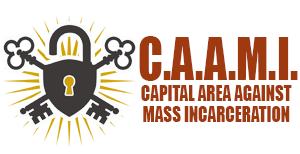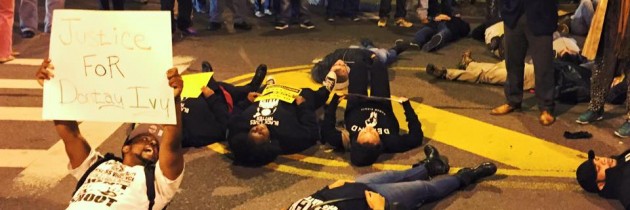We Still Can’t Breathe: Justice for Dontay Ivy
Shortly after midnight on April 2, 2015, Donald “Dontay” Ivy died after being unconstitutionally stopped, violently assaulted and Tasered by Albany, New York, police officers.
On October 28, 2015, Albany County District Attorney David Soares announced that a grand jury had decided not to indict anyone in Ivy’s death. Given that district attorneys are almost always able to obtain indictments from grand juries, it seems likely that Soares did not try seriously (if at all) to obtain this indictment.
Capital Area Against Mass Incarceration (CAAMI) led a demonstration of several hundred people at an Albany police station right after Dontay Ivy’s death; carried out a series of actions demanding a full and open investigation in the following months; organized another mass protest on October 30, 2015, two days after Soares announced the non-indictment; and led a shutdown and takeover of an Albany City Council meeting on November 1. Voices were raised in pain and rage, including the heartbroken voices of Dontay’s family. Demands were made for the officers to be fired, for the district attorney to resign, and for the Albany Police Department to stop using Tasers and be completely disarmed. CAAMI vowed to continue and intensify our protests until fundamental changes are made.
Soares’ report was a whitewash, accepting the police account at face value. In a joint press conference with Soares, Albany Police Chief Brendan Cox said the three officers had not violated any policy and this was not a case of racial profiling.
Another Black person is dead at the hands of white police officers; no one is held accountable. Another district attorney fails to get an indictment, another police chief defends his department. The story is getting repetitive.
Albany was supposed to be different.
Dontay Ivy left his house to check his account at the local ATM for his benefit funds. Finding they were not yet available, he was on his way home when he was stopped by Albany police officers.
No full account of what happened next has been made public. Most of the available information comes from a public letter from Soares to Albany Mayor Kathy Sheehan, and most of that comes from the police officers. But the officers’ own account presents a horrifying – and unashamed – picture of a violent police assault on an innocent unarmed man who was minding his own business and presented no threat to anyone. Their own statements should have been enough to indict these officers and the policies, training, departmental culture and societal racism that led to Dontay Ivy’s death.
As described in Soares’ letter, the officers claimed they noticed Mr. Ivy because he was wearing a puff jacket with his hands in the sleeves when the temperature was “not that cold” – 26 degrees Fahrenheit. This and a couple of other equally ridiculous claims, such as “he was walking suspiciously,” were the sole basis for what they did next.
The officers were not looking for a suspect – no crime had been committed. The police account establishes that the officers violated Mr. Ivy’s rights from the moment they accosted him. They had no reasonable ground to suspect Mr. Ivy had been, was, or was about to be engaged in criminal activity, which is the constitutional requirement for a police stop to be lawful. When asked to show his hands – to prove he was not concealing a gun in the sleeve – Mr. Ivy complied. At that point, the officers changed their theory: If he was not concealing a gun, he must be concealing drugs. No racial profiling?
At each stage of the confrontation, the officers used the fear they created as an excuse to escalate to more violence. With no grounds for suspicion, they started a pat search in violation of the constitutional standard (which permits a pat-down or frisk only when the police reasonably suspect the person stopped is armed and dangerous). When Dontay moved his hands, they tried to put handcuffs on him, and when he resisted the handcuffs – not a crime, since he was not under arrest – they assaulted him, attempted to throw him to the ground and Tasered him. Then he began to run (also not a crime), with three officers chasing and repeatedly Tasering him. Finally, the officers threw him to the ground face down, beat him with batons, Tasered him some more and cuffed his hands behind his back. Mr. Ivy still had done absolutely nothing illegal or threatening and was not under arrest. The officers – there were five of them now – describe him as being “disruptive” while face down on the ground and handcuffed. They said he was screaming, flailing and arching his back – so they continued to beat him and decided to shackle his feet. After he was shackled, they said, he finally “calmed down,” and shortly afterward they rolled him over.
Dontay Ivy was dead.
The coroner said Dontay died of a stress-induced heart attack brought on by the confrontation, with Tasering a contributing (but not the only) factor. The district attorney found an “expert” from out of state to say that death is not a “reasonably foreseeable” result of Tasering (although it has killed at least 800 people, not counting police cover-ups). Dontay’s underlying heart condition and mental illness were said to be contributing factors, and perhaps they were, but you would not have to be mentally ill to panic in that situation.
Albany was supposed to be different. After decades of community activism, Albany community members had decisive input into the selection of the previous police chief in 2004 and the current Chief Cox earlier this year. District Attorney Soares was first elected with community backing in 2004 and became the first DA in the state to publicly oppose the Rockefeller Drug Laws, New York’s harsh sentencing structure for drug dealing and possession. The city’s policy calls for community policing and diversion, and there is a (toothless) police review board.
It looks good on paper – and in the paper. But sweet words in high places do not equate to changes on the ground, in the neighborhoods where the same cops are doing the same old dance. Just ask the young people on the street.
Dontay Ivy is the tip of the iceberg. If this is the treatment meted out to a mentally ill, unthreatening non-suspect, what must happen to a person of color suspected of a crime, or bold enough to challenge an abusive officer? Whose story haven’t we heard because they didn’t die?
Announcing that there were no indictments, Soares wrote, “Now the healing can begin.” Did he really think the community would accept the death of an innocent Black man by a violent police attack? That we would swallow excuses and cover-ups that guarantee that nothing will change? That we would sit still and wait for the next Dontay Ivy?
Dontay Ivy’s death was not an accident. It was the fully foreseeable result of the policies, patterns and practices of the Albany Police Department – and police departments all across this country. CAAMI’s demands are no more extreme than the abuses we are trying to stop. We want no more Dontays, no more over-policing, no more mass incarceration, no more youth in adult prisons (or any prisons), no more racially-targeted policies which endanger rather than protect our communities.
We have held demonstrations, protests, marches, art installations, teach-ins, sit-ins and die-ins to insist that Black Lives Matter here in the Capital District as they do everywhere. We will not stop until the policies, practices and culture that led to Dontay Ivy’s death are eradicated forever.
In the face of yet another Black death, we are defiant. Still, we can’t help but wonder, will anything ever change? Is our Black Lives Matter movement having any effect? Are things just getting worse? Why can’t we stop this nightmare? How do we keep on going in the face of such despair?
As we held vigils and die-ins and marches, quiet words were passed in the night from one activist generation to the next: What we do makes all the difference in the world, even when we are not strong enough to win. What kind of world would it be if no one said that Dontay’s death was an outrage? What if the only visible story was the one that says police killing people of color is okay? We couldn’t prevent them from killing Dontay, but we prevented them from killing his story. His life matters; his death matters. Our witnessing changes the face of reality. We haven’t won yet, but as long as we keep on showing up for justice, we haven’t lost yet either.
Written by Naomi Jaffe

